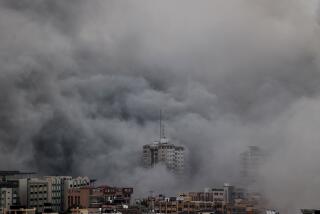Barbershop Rises From the Ruins in Quake-Stricken Pakistani Town
BALAKOT, Pakistan — Surrounded by collapsed buildings and the din of relief trucks rumbling through this earthquake-battered town, Mohammed Fazal serenely goes about his work, whistling a tune under his breath.
Amid the wreckage of his former salon, the 40-year-old hair stylist has wedged a traditional red-leather barber’s chair between the broken boulders and chunks of concrete. A regular customer sits beneath a bright orange sheet, tilted back at just the right angle, as Fazal trims his sideburns. They are talking about sports.
In the wake of the temblor that killed at least 86,000 people in mountainous northern Pakistan, Fazal knows that life goes on. And so does business.
Here in Balakot and surrounding towns, Pakistanis are slowly trying to pick up where they left off before the quake struck. Residents are returning to markets in search of essentials, such as tea, rice and meat. Many even have decided they need a haircut.
For that, Fazal is ready and open for business.
“If I can work, I should work,” says the veteran stylist, his own graying beard neatly trimmed. “It’s better to work with my own hands, to perform my livelihood, than wait in line and accept aid.”
The Oct. 8 quake hit during a busy time at Fazal’s shop on the ground floor of a five-story building in the town’s main marketplace. There was no chance to salvage anything, not even a pair of scissors. Along with his customers and two other stylists, Fazal ran for safety.
The temblor killed thousands in Balakot alone and destroyed most of the town’s 200 businesses. On the following day, when Fazal returned to the shop, the only remnant of two decades’ work was a now-twisted fan he had used to cool his customers on the hottest days.
He immediately traveled to a nearby town and bought a used barber chair and a comb, scissors and grooming brush. Within days of the magnitude 7.6 quake, Fazal’s makeshift shop rose from the ruins.
At first, customers were scarce. But slowly, people picked their way through the wreckage, walking up a mound of rocks to Fazal’s chair. Business soon boomed. So the haircutter decided that others also should get back to business.
Fazal went door to door in the shattered town, encouraging others to resume their trades. Many were reluctant to return to wrecked shops, fearful of aftershocks.
But Fazal insisted: If you can’t conduct business inside, do it outdoors.
Now, a month and a half after the quake, butcher shops, fruit stands, shoe stores, newspaper vendors and stalls selling rice and tea line the town’s main drag.
“As businessmen, we wanted to give people a sign that this town was not going to die, that life was going to start over again,” Fazal says. “We all need help from the government to rebuild. But we also have to start doing things ourselves.”
Fazal works briskly alongside his son and another stylist. Clumps of gray and black hair are sprinkled among the dust and rocks. He sets the tools of his trade on a nearby slab of concrete. Customers hang their hats and coats from a jutting piece of rebar. They shake hands and hug.
In Fazal’s chair, regular customer Mohammed Maroof is happy with the attention after waiting half an hour for this space. The 40-year-old government worker says getting a haircut offers him some comfort.
“Those who are gone are gone,” says Maroof, who lost four family members. “I am glad this shop is open. I want to see the friends I have known for years. I want to hear about their families and console the ones who lost loved ones. But the earthquake has passed. Coming to this shop is one routine we will keep here.”
Fazal’s entrepreneurial spirit has caught on. The other merchants he urged to return to work are doing land-office business.
Just down the road, Assad Ullah sells rice from a huge tin container on the steps of a collapsed hotel. Customers squat beside him, shoveling rice with red plastic plates the owner keeps in a box nearby.
The 40-year-old father of six earns 150 rupees a day, about $2.50, enough to feed his family. “For me, it is enough,” he says. “It’s important to start again, even if you have to start small.”
Saeed Mohammed supports that theory. The 60-year-old lost his car parts store nearby. Now there are few cars to service. So Mohammed is switching strategies to meet the new demands of the market.
On this day, he and his partners use shovels and axes to carve out a space among the wreckage to open a food stall that will sell rice, tea and traditional meat kebabs.
“We can start this business with very little money,” he says as he pulls used nails from a piece of shattered 2-by-4. He has even done his market research, checking with shops to gauge the going rate for a plate of rice.
“I checked around,” he says. “I think 20 rupees is a fair price.”
At his barbershop, Fazal has not changed his prices: twenty rupees -- about 30 cents -- for a cut and half as much for a shave. For now, he works outside, running for cover when the frequent rain showers hit. As winter approaches, he’s looking for a tent to move his business indoors.
“If I get a tent I will stay -- if I don’t get a tent, I will stay,” he says, sliding the orange sheet from another well-clipped customer. “This city is my home. We are committed to rebuild here. And sooner or later, everyone needs a haircut.”
More to Read
Sign up for Essential California
The most important California stories and recommendations in your inbox every morning.
You may occasionally receive promotional content from the Los Angeles Times.











